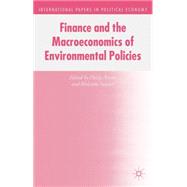- ISBN: 9781137446121 | 1137446129
- Cover: Hardcover
- Copyright: 1/23/2015
The International Papers in Political Economy (IPPE) series explores the latest developments in political economy. This eleventh volume presents a collection of eight papers, examining current and previous environmental policies, and suggests alternative strategies for the future. Addressing resource depletion and climate change are pressing priorities for modern economies. Planning energy infrastructure projects is complicated by risk and uncertainty, as such clear and coherent government policies have a crucial role to play.
The authors examine the problems with theoretical frameworks in terms of their environmental impact, such as New Consensus Macroeconomics, Post Keynesian and Derridean thinking, and emphasising New Thing in Economics. Reflecting on the current global crisis, this book argues that it is a direct consequence of a development model that is unsustainable from the financial, economic, social and environmental points of view. In addition the authors explore the problems of financing constraints, risk and uncertainty for the effective planning and construction of renewable energy infrastructure, and consider the links between the financial system, economic growth and environmental pollution and damages.
This book offers detailed analysis and informed comment on the future of environmental policies. It is essential reading for students, scholars, researchers and policy-makers interested in environmental policy.
The International Papers in Political Economy (IPPE) series explores the latest developments in political economy. This eleventh volume presents a collection of eight papers, analysing the macroeconomics of ecological sustainability and environmental policies and the relationships between the financial system, economic growth and environmental pollution.
The contributions range from a critical assessment of the absence of environmental considerations from the New Consensus Macroeconomics through to the development of Post Keynesians, institutional and Derridean analyses for ecological sustainability; they are also within the spirit of New Thinking in Economics. In addition, they cover the financing of a low-carbon energy future, the search for sustainable growth and the interrelationships between the financial system, neoliberalism and sustainable development.
This book offers detailed analysis and informed commentary on the macroeconomics and financial analyses of environmental policies. It is essential reading for students, scholars, researchers and policy makers interested in ecological sustainability.
The authors examine the problems with theoretical frameworks in terms of their environmental impact, such as New Consensus Macroeconomics, Post Keynesian and Derridean thinking, and emphasising New Thing in Economics. Reflecting on the current global crisis, this book argues that it is a direct consequence of a development model that is unsustainable from the financial, economic, social and environmental points of view. In addition the authors explore the problems of financing constraints, risk and uncertainty for the effective planning and construction of renewable energy infrastructure, and consider the links between the financial system, economic growth and environmental pollution and damages.
This book offers detailed analysis and informed comment on the future of environmental policies. It is essential reading for students, scholars, researchers and policy-makers interested in environmental policy.
The International Papers in Political Economy (IPPE) series explores the latest developments in political economy. This eleventh volume presents a collection of eight papers, analysing the macroeconomics of ecological sustainability and environmental policies and the relationships between the financial system, economic growth and environmental pollution.
The contributions range from a critical assessment of the absence of environmental considerations from the New Consensus Macroeconomics through to the development of Post Keynesians, institutional and Derridean analyses for ecological sustainability; they are also within the spirit of New Thinking in Economics. In addition, they cover the financing of a low-carbon energy future, the search for sustainable growth and the interrelationships between the financial system, neoliberalism and sustainable development.
This book offers detailed analysis and informed commentary on the macroeconomics and financial analyses of environmental policies. It is essential reading for students, scholars, researchers and policy makers interested in ecological sustainability.







